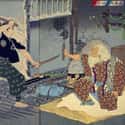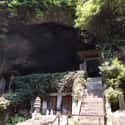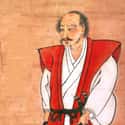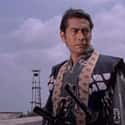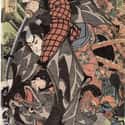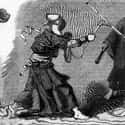-
(#7) He Invented His Own Two-Sword Technique
Unlike most famous duelists of the time, Musashi Miyamoto was not classically trained in a sword school. Instead, he developed his own technique, honing his skills with daily practice.
The Niten Ichi Ryu school of kenjutsu developed by Musashi utilizes both katana (long) and wakizashi (short) swords that samurai typically carried with them. Wielding these swords simultaneously was revolutionary at the time. Musashi believed using two hands to hold a sword, as was the common practice, to be cumbersome. The technique also placed one at a disadvantage in certain situations, such as battles performed on horseback.
Thus, Musashi believed samurai should wield a sword in one hand for increased fluidity of motion. Logically, the other hand could then be used to wield the second sword. This technique is still taught in Japan today. The school traces its lineage to Musashi through his direct pupils.
-
(#13) He Wrote A Book Of Five Rings In A Mountain Cave Near A Zen Monastery
After suffering an attack of neuralgia, Musashi sensed his life was nearing its end. In 1643, he retired to Reigando, a mountian cave near Kumamoto (far to the south of Japan, near Nagasaki). The cave was part of a Zen monastery, where Musashi went to sit in contemplation and pen A Book of Five Rings, as well as the shorter Dokkodo (The Way of Walking Alone).
A Book of Five Rings is a treatise not only on swordsmanship but on strategy and philosophy. It can be thought of as an outline of the path to enlightenment by the way of strategy, as phrased by Musashi. The book is divided into five sections, reflecting five elements: earth, water, fire, wind, and void. The book intertwines practical advice with Zen philosophy and is still highly regarded in the 21st century.
In his book, Musashi wrote,
"When I reached thirty I looked back on my past. The previous victories were not due to my having mastered strategy. Perhaps it was natural ability, or the order of heaven, or that other schools' strategy was inferior. After that, I studied morning and evening searching for the principle, and came to realize the Way of strategy when I was fifty."
-
(#10) He Died With His Sword In Hand
At 61 or 62, after completing A Book of Five Rings, finishing the Dokkodo, and suffering from neuralgia – a painful nerve disorder – Musashi knew he was dying. He summoned the monks he was staying with in the monastery near Reigando, pulled himself up onto one knee and, holding his sword in one hand and cane in the other, died like a true samurai warrior.
Many believe his cause of death to be thoracic cancer. He was buried standing and dressed in full samurai body armor.
-
(#11) A Manga Based On His Life Sold 82 Million Copies
To say Musashi Miyamoto is popular in Japanese culture is an understatement. One of the few railway stations in Japan named after a person is Miyamoto Musashi Station, near Musashi's birthplace. A Book of Five Rings is still read by martial artists, executives, and civilians alike. In the 1930s, Eiji Yoshikawa's fictional novel Musashi was so popular, people mistook it for a historical account. The serialized manga based on the novel, named Vagabond, has sold more than 82 million copies worldwide.
The most popular Musashi-related work (aside from his own writings) is probably the 1950s Samurai Trilogy staring Toshiro Mifune. The three films follow Musashi's life and memorable duels. They are only partially historically accurate, but they still provide a fascinating insight into Musashi's legacy.
-
(#9) He Spent Years Wandering As A Shugyosha
When Musashi was a teenager, he left his hometown to trek around Japan. His samurai journey, called musha shugyō, saw him wandering the wilderness training, dueling those he could challenge, and living a taxing, minimalist lifestyle. Becoming a homeless vagrant was a common way to develop a name for yourself as a samurai, and often landed warriors employment. Life as a shugyosha wasn't easy, but it helped Musashi become a fierce warrior.
In A Book of Five Rings, Musashi wrote, “Do not sleep under a roof. Carry no money or food. Go alone to places frightening to the common brand of men. Become a criminal of purpose. Be put in jail, and extricate yourself by your own wisdom.”
-
(#8) He Fought Against – And Defeated – Masters Of Every Weapon
Musashi didn't just fight swordsmen in duels; he purposefully sought out masters of every weapon. In 1607, he sought out an undefeated master of the kusarigama (sickle and chain) named Shishido Baiken. According to legend, Baiken struck first with the chain, dulling and bending Musashi's blade. As the two drew close to one another, Musashi pulled out his short sword, usually only used in ritual suicide. Baiken hesitated, providing Musashi with the opportunity to drive the short sword into Baiken. With his last breath Baiken whispered, "Thank you."
Later that same year, Musashi defeated Muso Gonnosuke who was a master of jojutsu (a short staff technique). At the time, Gonnosuke had allegedly never lost a duel. Since the two agreed to battle with wooden swords, Gonnosuke survived, despite his defeat. Gonnosuke spent years training for a rematch, only for Musashi to win again.
In A Book of Five Rings, Musashi wrote, "You should not have a favorite weapon. To become over-familiar with one weapon is as much a fault as not knowing it sufficiently well."
New Random Displays Display All By Ranking
About This Tool
The identity of a Japanese samurai is a hereditary heritage, not a profession. Some samurais are also very prestigious scholars, and they can also serve as civil and military administrators, clergy, painters, and aestheticians. There were many famous samurai in history, the greatest should be Musashi Miyamoto. He was a famous swordsman at the end of the Sengoku period in Japan and became famous for his superb swordsmanship and achievements.
Miyamoto Musashi lived in a turbulent historical period, but he devoted himself to the study of warfare and swordsmanship and made great achievements. The random tool shares 14 facts about the violent life of this greatest samurai.
Our data comes from Ranker, If you want to participate in the ranking of items displayed on this page, please click here.











